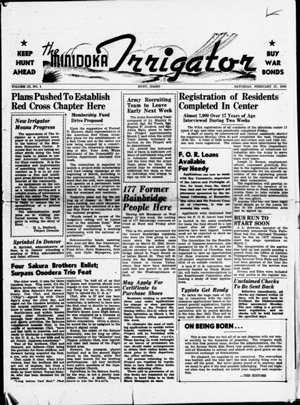The Library of Congress has digitized & posted online a large collection of WWII Japanese-American Relocation Camp Newspapers. The following is from their website:
“Produced by the Japanese-Americans interned at assembly centers and relocation centers around the country during World War II, these newspapers provide a unique look into the daily lives of the people who were held in these camps. They include articles written in English and Japanese, typed, handwritten and drawn. They advertise community events, provide logistical information about the camps and relocation, report on news from the community, and include editorials.
“After the attack on Pearl Harbor on December 7, 1941, fears ran high among the American people. President Franklin D. Roosevelt signed Executive Order 9066 on February 19, 1942, allowing for the exclusion of persons from designated areas for security purposes. The order did not designate any specific group for exclusion, but in practice it was primarily used against people of Japanese ancestry, both citizens and legal residents. There was no mass incarceration of American citizens or residents from any other group. A 1982 Congressional commission later noted in their report, Personal Justice Denied, that “the broad historical causes which shaped these decisions were race prejudice, war hysteria and a failure of political leadership.”[1]
“Nearly 120,000 American citizens and residents of Japanese descent living along the West Coast were removed from their homes, bringing only what they could carry. They were forced to go to various assembly centers and relocation centers located throughout the Western United States. These camps, run by the Army and the War Relocation Authority, were created with temporary structures and barracks, surrounded by barbed wire. The living conditions were deplorable with large families housed in small rooms or even converted stables, and barracks that were not insulated against harsh winters or high heat. The rudimentary living conditions and prison-like environment, however, did not prohibit the people in these camps from forming their own communities and culture.”
Check out the online collection.
Thanks to ResearchBuzz for the heads-up.
